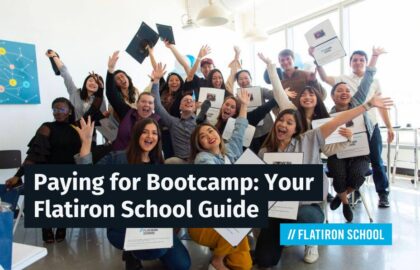This article on developing a personal story is part of the Coaching Collective series, featuring tips and expertise from Flatiron School Career Coaches. Every Flatiron School graduate receives up to 180 days of 1:1 career coaching with one of our professional coaches. This series is a glimpse of the expertise you can access during career coaching at Flatiron School.
So, there you are. You’ve just received an invitation to interview for your dream job and you are scared to death.
Naturally, you want to make a good impression and advance to the next round. You have heard that the first interview is a light get-to-know-you meeting with a recruiter. Easy, right? Then why are you feeling terrified?
If you are a graduate of Flatiron School it’s probably because you have just invested a tremendous amount of effort and time to get to the point where you are qualified to be considered for a position in tech. A lot is riding on this interview going well and you don’t want to mess it up.
Here’s the secret to acing first round interviews that I’ve been sharing with my clients for years:
Your story is your most valuable asset. In other words, you won’t be hired for what you do, you’ll be hired for how and why you do it.
I’m not saying technical skills don’t matter; they matter a great deal. What I’m saying is that humans don’t hire a set of technical skills. They hire other humans.
In this article, I’m going to focus on the first-round screen interview and give you a sense of how to develop an authentic story that will increase your invitations to second-round interviews.
The “tell me about yourself” Question
When I was a technical recruiter, I conducted dozens of screening interviews per week. Most of them followed a similar pattern.
When I asked the question you’re likely to get in just about every interview – tell me a little bit about yourself – most of the time the responses were a boring rehash of what was on their resume.
“…well, I graduated from this school, then I got my first job and learned this or that skill/tool, then I got my next job…” blah, blah, blah
When asked this question, what most people do is recite what’s on their resume. But, if a recruiter has selected you for an interview, they are already familiar with what’s on your resume (at least they should be). This is your opportunity to personalize your experience and build meaningful rapport with your interviewer.
Rather than talk about what you do, it’s much better to offer a story that communicates how and why you do what you do.
The Power Of A Personal Story
Here’s an example of how a former client aced his interviews by highlighting how and why he does what he does rather than what he does.
Interviewer: “Hi Jesse, please tell me a little bit about yourself.”
Jesse: “Hi and thanks for meeting with me today. I have always been the sort of person who is a very careful decision maker. Even when I was a little kid, I was the only one of my brothers who read the instructions for the model airplane kits my grandfather used to give us. My brothers would tear into the box and start improvising. But not me. I read the instructions and my airplanes always looked great. I’ve always been like this. So, when it came time to decide which career to choose, I knew it had to be something that would utilize my instincts to be exacting and precise. That’s why I chose engineering and ultimately quality assurance.”
What Jesse is doing is placing the focus on how and why he does what he does.
He’s a careful decision maker because he values precision. He’s signaling that he was hard-wired to be an engineer even before he knew that he wanted to be one.
Sure, his technical engineering skills will be vetted in subsequent interview rounds, but unless he sufficiently impresses this interviewer he’ll never have that chance.
By sharing his background in this manner he’s much more likely to make an emotional connection with the recruiter and be referred to the next round.
How To Develop Your Story
So, how do you develop a story? The key is to connect the dots between where you started and where you are today.
Think back to when you were younger. Is there something you did when you were a child that you still do today? You might use different tools, methods, or strategies, but there is something you did then that you still do now.
Maybe you constantly doodled in the margins of homework assignments, or obsessively organized your toy chest. Did you methodically beat every level of Pac-man? Spend every waking moment outside turning over rocks to look for insects?
Whatever your “thing” is, it transcends what you do for work and finds its way into other parts of your life – your weekends, hobbies, and ultimately your career. It is the seed of your brand story that you’ll start with to build a compelling story.
Next, pinpoint a specific occurrence you can relate to your career path.
Try to remember a time when you were proud of yourself. What did you do? Why did you do it? How did you feel about yourself for doing this thing?
For example, maybe you were the maverick kid on your block who invented a new game to play with your friends because you love social interaction and learning how to do something new. Creative problem solving and cohesion among team members is highly valued in most companies. It would be easy to develop an authentic story that signals you are hard-wired to solve tough problems and work well with others.
Another way to access this is to play around with finishing the sentence: I’ve always been the sort of person who… [blank].
This is how Jesse and I came up with his story, and a great way to identify your authentic values and ensure that you’ll be appreciated for your authenticity because your how, what, and why are aligned.
Need Help Building Your Story?
If you are feeling a little stuck with your story, don’t feel bad. It takes practice and it can be hard to do alone.
Working with a Career Coach is a powerful way to access your story. Coaches are trained to ask provocative questions and help you construct an authentic story that works.
The graduates of Flatiron School have a huge advantage when it comes to preparing for interviews. That’s because all Flatiron School graduates enjoy up to 180 days of one on one career coaching.
Career Coaches are experts when it comes to the how and why of interviews. We are invested in your success and we genuinely get a kick out of witnessing your transition into technology careers.
So, let’s get started. Tell me a little bit about yourself….
About Dyana King
Dyana King is a career coach with Flatiron School. She previously worked as a technical recruiter and co-founded a technical recruiting agency, Thinknicity. She became a certified professional coach (CPC) in 2012 and specialized in transition and career engagement coaching.




